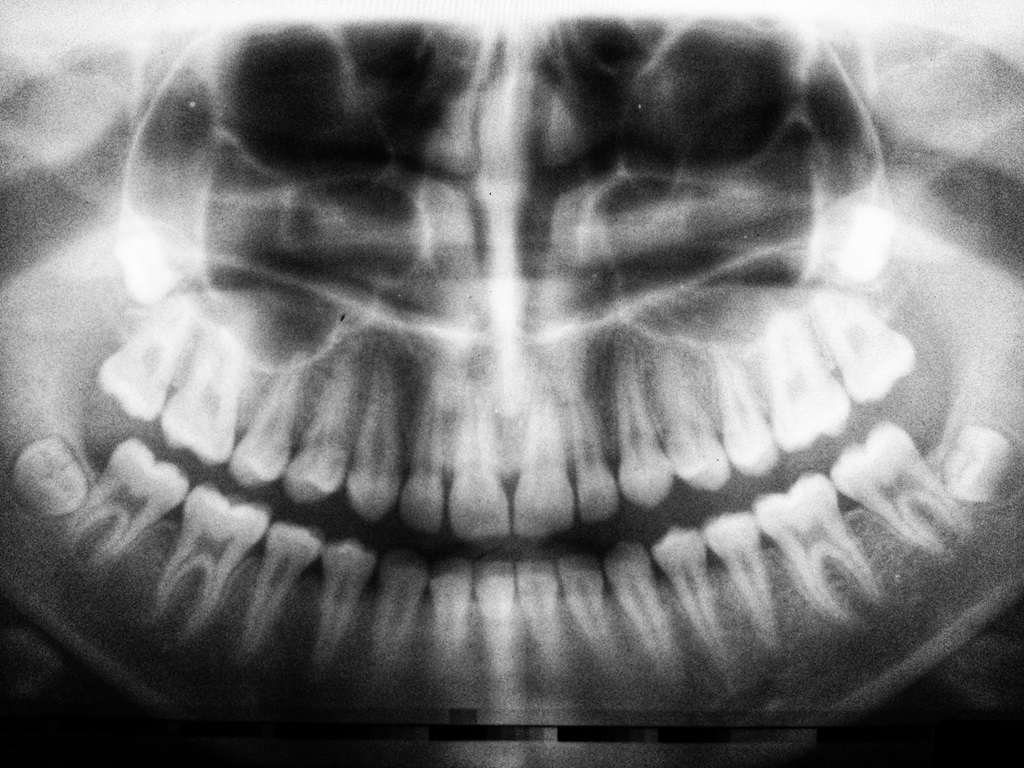Mikor és miért lehet szükség a bölcsességfog műtétre?
A bölcsességfogak tulajdonképpen a harmadik nagyőrlőfogaink, melyek a fogsor legutolsó elemei. A korai embereknek még szükségük volt ezekre a fogakra, ma már azonban a legtöbbek számára csak gondot jelentenek. Ezek a fogak az emberi evolúció nyomait hordozzák, de a modern étrend és az anatómia miatt feleslegessé váltak, és gyakran okozhatnak egyaránt kényelmetlenséget és egészségügyi problémákat. Cikkünkben bemutatjuk a bölcsességfogak történetét és szerepét, valamint azt is, hogy mikor és miért lehet szükség egy bölcsességfog műtétre.

A bölcsességfogakról röviden
A bölcsességfogak, ahogy azt már említettük, a harmadik nagyőrlőfogaink. Általában négy ilyen fog található a felnőttek szájában, egy-egy darab minden kvadránsban, azaz negyedívben. A bölcsességfogak főleg a korai serdülőkorban kezdenek el kialakulni, de az is előfordulhat, hogy csak a késő tizenéves vagy a húszas évek elején törnek elő, vagy egyáltalán ki sem nőnek. A bölcsességfogak optimális esetben szépen fokozatosan emelkednek ki az ínyen keresztül, egyenes irányban kifelé a lágyszövetből. De miért is lehet szükség a bölcsességfog eltávolítására?
A fentiek mellett többféle előtörési móddal találkozhatunk. Ezek a fogak teljesen vagy csak részlegesen bújnak ki az íny alól. Emellett előfordulhat az is, hogy a fog az állcsontban marad. Ekkor mindenképpen érdemes számolni a bölcsességfog műtét valószínűségével. A legjobb lehetőség az, amikor a fog egyenesen kifelé nő, a többi foggal párhuzamos irányban. Előfordulhat viszont, hogy oldalirányban vagy ferdén indul meg a növekedése, ezzel akár károkat okozva a szomszédos fogakban. Ekkor szükséges lehet egy bölcsességfog műtét.

A bölcsességfogak szerepe
Az emberi evolúció során a bölcsességfogaknak meghatározó szerep jutott, és akkor még nem feltétlenül volt nyűg egy ilyen fog jelenléte. Távoli őseink, akiknek alapvetően a mainál nagyobb állkapcsuk volt, olyan táplálékot fogyasztottak, amely nehezebben volt rágható. Az ősi étrend kemény, rostos növényi anyagokat és nyers húsokat tartalmazott, amelyeknek az őrléséhez elengedhetetlenek voltak a bölcsességfogak, és akkor még nem voltak korszerű bölcsességfog műtétek. Ráadásul az eredeti fogak gyakran tönkrementek és kihullottak, vagy eltávolították őket, így jól jött még egy extra rágófog a 20-as években is.
A modern emberi táplálkozás azonban alapvetően megváltozott, így előfordulhat, hogy szükséges a bölcsességfog eltávolítása. A puhább és feldolgozottabb ételek fogyasztása általában kevesebb rágást igényelt, a főzés és az ételkészítés fejlődése megkönnyítette az ételek megrágását is. Ennek eredményeként a nagy és erőteljes őrlőfogak szükségessége jelentősen lecsökkent, és a bölcsességfogak jelentősen vesztettek evolúciós funkciójukból is. Ezért is lehet ma szükség a bölcsességfog műtétre, hiszen a fogak nem úgy viselkednek, ahogyan azt tették az ősi időkben.
Mindemellett még az emberi állkapocs mérete is megváltozott az évezredek során, így nem meglepő, hogy a fogazatnak nem maradt elegendő hely a szájban. A modern ember állkapocsméretei általában kisebbek, és ennek eredményeképpen a bölcsességfogaknak gyakran nincs elég helyük a megfelelő kibújáshoz. Ez pedig gyakran vezethet bölcsességfog műtéthez.
Ez a csökkent jelentőség és a szűk tér gyakran okoz fogászati problémákhoz, mint például a fogazat túlzsúfoltságához, a fogak eltolásához, kifordulásához és a bölcsességfogak beékelődéséhez. Az emberi evolúció során kialakult bölcsességfogak tehát nemcsak a múltunkra, hanem a mai fogászati kihívásainkra is emlékeztetnek. Ráadásul manapság már igencsak gyakori beavatkozásnak számít egy bölcsességfog műtét.

Milyen problémákat okozhat a bölcsességfog?
Ezek a kényes fogak számos problémát okozhatnak nemcsak abban az esetben, ha nem tudnak a megfelelő irányban előtörni, hanem akkor is, amikor normális a növekedésük. Ekkor érdemes szakemberrel konzultálni, aki akár a bölcsességfog műtétet is javasolhatja. Milyen problémákkal találhatjuk szembe magunkat?
Impaktáció
Az impaktáció azt a foghelyzetet jelenti, amikor a bölcsességfog nem tud teljesen előtörni a szájban elfoglalandó normál helyére. Ez akkor fordul elő leginkább, amikor a bölcsességfog nem kap elegendő teret a növekedéshez, vagy más fogak, esetleg csontok akadályozzák az útját. Az impaktált bölcsességfogak fájdalmat, kellemetlenséget és problémákat okozhatnak. Ebben az esetben javasolt a bölcsességfog műtét, így megelőzhetőek a szövődmények, és azok következményei.
Túlzsúfoltság
A bölcsességfogak hozzájárulhatnak a fogsor túltelítettségéhez, ami gyakran bölcsességfog műtétet vonz maga után. Sokszor nincs elegendő hely a bölcsességfogak előtöréséhez, és ezért nyomást vagy feszültséget gyakorolnak a szomszédos fogakra. Ez pedig sajnos rendellenességekhez, kellemetlenségekhez és akár harapási problémákhoz vezethet.
Mindemellett a szomszédos fogak is elmozdulhatnak, ami további problémákat, és akár fogvesztést is okozhat. Ekkor ajánlott elgondolkodni a bölcsességfog eltávolításán, hogy a többi fog ép maradhasson hosszabb távon.

Fertőzés
A bölcsességfogak gyakran réseket hoznak létre az íny és a fogak oldalai között, ahol ételmaradékok rekedhetnek meg és baktériumok telepedhetnek meg. Ezek pedig a nem megfelelő tisztítás miatt ínygyulladáshoz vezethetnek, ami fájdalommal, duzzanattal és kellemetlenséggel párosulhat. Súlyos esetekben a fertőzések átterjedhetnek a torokra vagy a nyakra, és komoly egészségügyi problémákat okozhatnak.
Ezért fontos rendszeresen ellenőrizni a bölcsességfogakat, és ha probléma merül fel, akkor javasolt időben orvosi segítséget kérni. Sokan viszont sajnos az utolsó pillanatra hagyják ezt a lépést, így nem marad más megoldás, mint a bölcsességfog műtét.
A szomszédos fogak károsodása
A bölcsességfogak nyomást gyakorolhatnak a szomszédos őrlőfogakra, ami különféle fogászati problémákhoz vezethet. A szomszédos fogak megsérülhetnek vagy elmozdulhatnak, ezenkívül a bölcsességfogak további károsodást okozhatnak a szomszédos foggyökerekben, ami hosszú távú problémákat generál a fogak egészségében és állapotában.
A fogorvosok rendszerint figyelemmel kísérik a bölcsességfogak hatását a szájban lévő többi fogra. Ha bármilyen probléma merül fel, akkor pedig egy erre alkalmas kezelést, vagy bölcsességfog műtétet javasolhatnak annak érdekében, hogy megőrizzék a fogazat egészségét. Ezért is fontos időben felkeresni egy fogorvost vagy egy szájsebészt, aki a megfelelő javaslattal állhat elő a probléma enyhítésének és megoldásának érdekében.

Gyakori tünetek
A bölcsességfogak sajnos sokszor okoznak kellemetlen tüneteket azoknál, akik érzékenyek erre, vagy még növésben vannak a fogaik. Azonban akkor is előfordulhatnak panaszok, amikor nem volt megfelelő a fogak tisztítása, és a beférkőző baktériumok gyulladást okoztak. Emellett akkor is, ha éppen a fog nem tört elő teljesen az íny alól, így az ott maradt ételdarabok és a rátelepedő baktériumok miatt gyulladás jön létre. Ilyenkor érdemes átgondolni a bölcsességfog műtét lehetőségét is, hiszen komolyabb esetekben már nem biztos, hogy érdemes megmenteni a fogat.
Milyen tünetekre érdemes figyelni?
- Fájdalom vagy kellemetlen érzés a száj hátsó részén.
- Az íny duzzanata és érzékenysége az érintett területen.
- Nehézségek a száj kinyitásakor.
- Kellemetlen íz vagy rossz lehelet a megrekedt étel és baktériumok miatt.
- Fájdalom vagy kellemetlen érzés rágás közben.
- Bölcsességfog-fájdalommal járó fej- vagy fülfájás.
A fentiekből látható, hogy a panaszok nem feltétlenül egy nap alatt alakulnak ki. Ráadásul rendszeres ellenőrzéssel időben kiszűrhető a probléma, és a bölcsességfog műtét is elkerülhető. Más esetekben azonban a bölcsességfog eltávolítása javasolt, ha nem szeretnénk, hogy hosszabb távon komolyabb probléma keletkezzen a többi fog esetén.

Így zajlik a műtét
A bölcsességfog műtét első lépése az előzetes felmérés. Ennek során az orvos áttekinti a kórtörténetet, megvizsgálja a páciens fogát és kikérdezi az esetleges allergiákról. Így megvitathatják a kezelés menetét és az esetleges aggályokat is.
A bölcsességfog műtét következő lépésében a szájsebész érzésteleníti az adott területet egy kellemes ízű zselés anyaggal, majd ha ez hatott, akkor egy erősebb hatóanyagú injekciót is kap a páciens. A bölcsességfog műtét során a szakorvos bemetszést végez a fog feletti ínyen, ami egyáltalán nem érződik a kapott injekció miatt, így nem kell ettől félni. Ráadásul minden esetben előre elmondja azt is, hogy mi történik éppen, ami sok betegnek nyugalmat ad.
Előfordulhat, hogy egyes esetekben az állcsont egy kis részét el kell távolítani a fog eléréséhez, de ebben az esetben sem kell félni, hiszen nagyfokú tapasztalattal bíró orvosaink tökéletesen elvégzik ezt a műveletet is. Ezután a sebész speciális eszközök segítségével óvatosan eltávolítja a bölcsességfogat.
A bölcsességfog műtét közben komplikációk is előfordulhatnak. Ha a fog problémás vagy az állcsontban megrekedt a növekedése, akkor megeshet, hogy kisebb részekre kell osztani a könnyebb eltávolítás érdekében. Ennél fogva a fog darabonként kivehető a bölcsességfog műtét során, így nincs szükség nagyobb bemetszés és seb kialakítására. A fog eltávolítása után a sebész azonnal összevarrja a bemetszés helyét, ennek következtében pedig megkezdődhet a műtét utáni gyógyulás.
A varratok ma már egy speciális, felszívódó anyagból állnak, de ha a páciens számára kényelmetlenné válik, akkor a gyógyulást követően egy kontroll kíséretében ez eltávolítható. A páciens a műtét után részletes utasításokat kap, beleértve az étkezésre, ivásra és a fájdalomcsillapításra vonatkozó irányelveket. Fontos, hogy semmilyen tejtermék fogyasztása nem ajánlott a bölcsességfog műtét utáni napokban, például a tejeskávé sem.
Emellett tájékoztatjuk a pácienseinket a lehetséges mellékhatásokról és szövődményekről is, hogy mindennel tisztában legyenek. A felépülési idő személyenként változó lehet, de általában néhány naptól egy hétig tartó pihenéssel és korlátozott fizikai aktivitással jár. Így a fog helye megfelelően meggyógyulhat, és nem okoz majd problémát a későbbiekben.
Összefoglaló
A bölcsességfogak gyakran okoznak különféle problémákat, akár hatással a szomszédos fogakra is. Amikor ezek a problémák jelentkeznek, akkor sokszor a bölcsességfog műtét lehet az egyetlen megoldás. A beavatkozás során a bölcsességfogat eltávolítják annak érdekében, hogy megszűnjön a fájdalom, valamint ezzel megelőzve a fertőzéseket és a későbbi komplikációkat. A műtét után fontos, hogy a páciensek kövessék a szájsebész utasításait a gyors és zökkenőmentes felépülés érdekében. Amennyiben gyulladt, fájdalmas érzésed van valamelyik bölcsességfogaddal kapcsolatban, keresd fel bátran a 360 Dental Fogászatot és Szájsebészetet, rendelőnket!



